If you want to get off the beaten track in Bangladesh, follow the Meghna. This travel guide to Nijhum Dwip, Bangladesh (pronounced ni-jum deep) has all the information you need to plan a trip to this southern island famed for its spotted deer.
In the south of Bangladesh, a smattering of islands sits at the intersection of the Meghna river and the Bay of Bengal. Nijhum Dwip, which means “Silent Island”, is a small island at the southern tip of Hatiya sub-district. Though a decent number of domestic tourists make it down to the island, it’s not well known to foreigners.
The Silent Island is best known for its national park with a significant spotted deer population. Pleasant as the park was, I found the island more notable for its remote location and the friendliness of its people. I was on a mission to find a green place where I could wander around and enjoy Bangladeshi village life, and on Nijhum Dwip, it was all too easy.
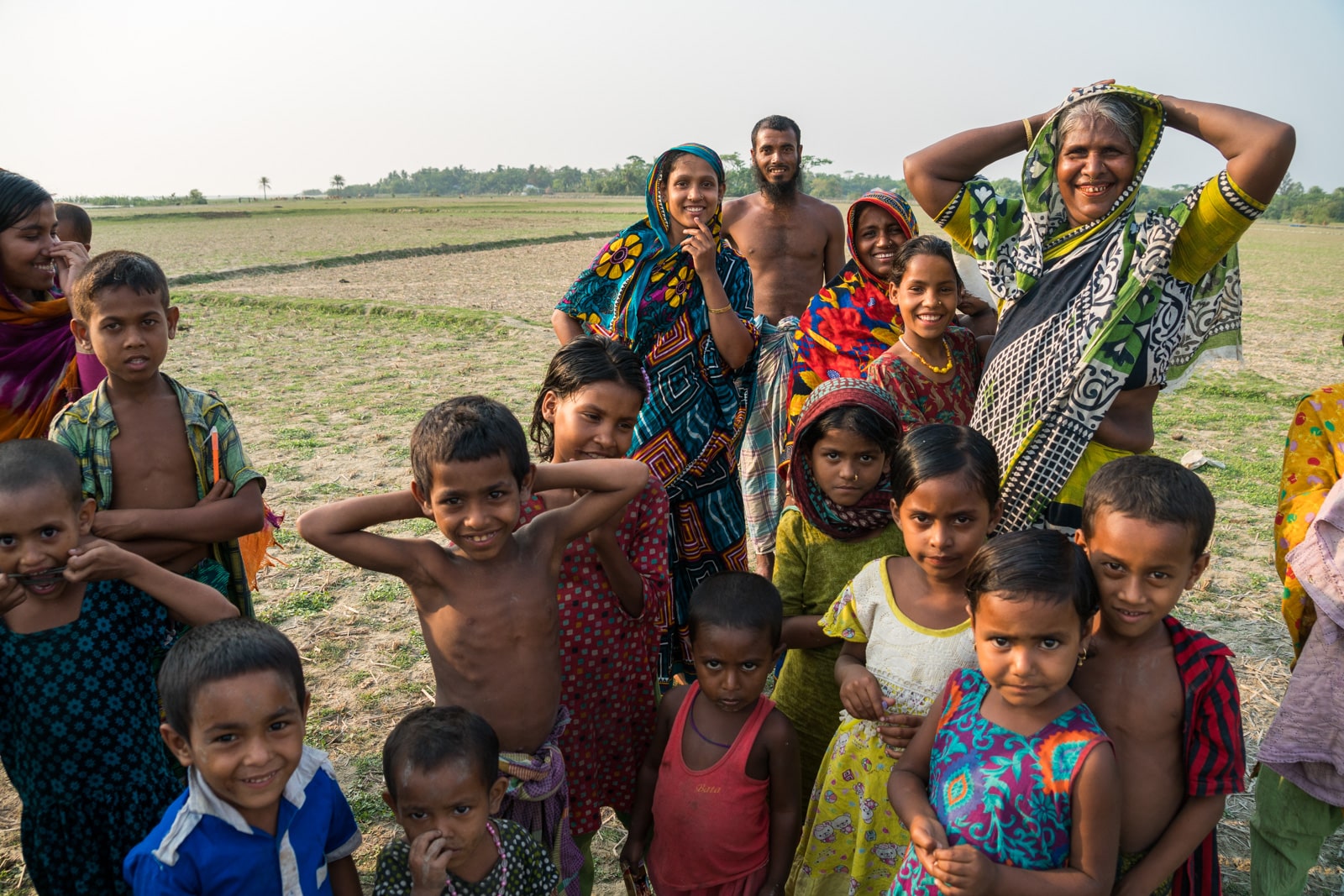
That time I couldn’t get anywhere because there were a million and one jolly people coming to check me out
If you’re looking to get off the beaten track in Bangladesh and/or get lost in a bit of nature, this island is a great place to do so!
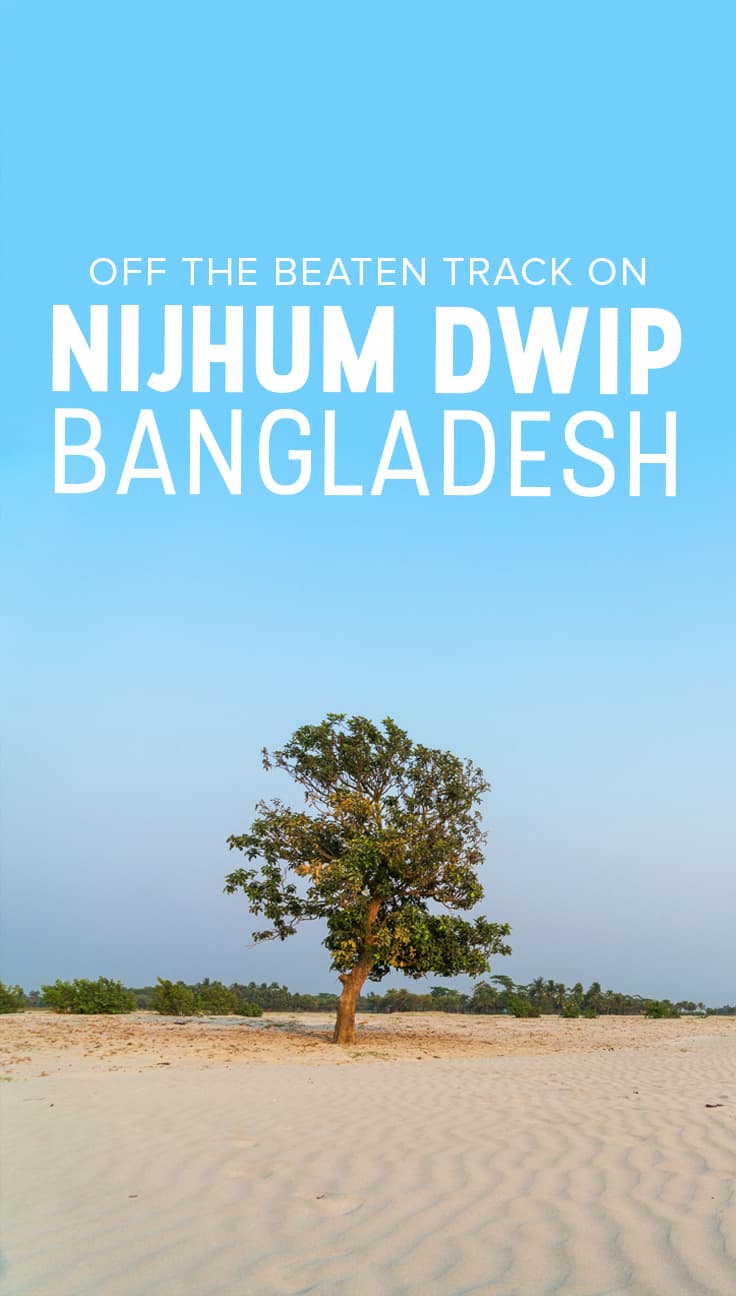
Might be useful? Pin it!
Lost With Purpose’s guide to Nijhum Dwip, Bangladesh
What’s here?
- How to reach Nijhum Dwip from Dhaka
- Things to do on Nijhum Dwip
- Where to stay on Nijhum Dwip
- Where to eat on Nijhum Dwip
- Security on Nijhum Dwip
- Responsible tourism on Nijhum Dwip
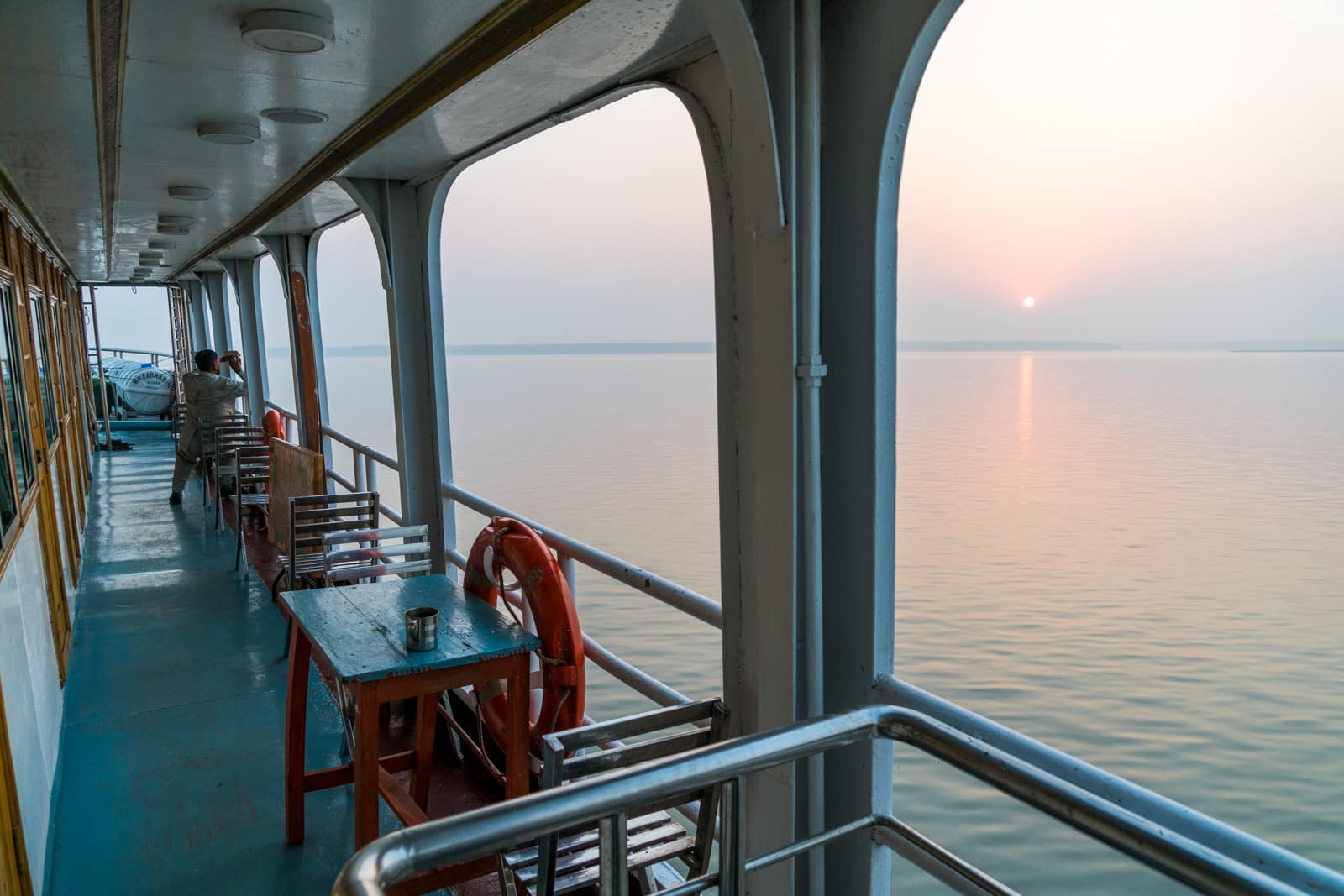
Sunrise from the launch just before reaching Hatiya
How to reach Nijhum Dwip from Dhaka
The journey from Dhaka to Nijhum Dwip was a highlight in and of itself! Here’s how to reach Nijhum Dwip from Dhaka… the fun way.
Note: If coming from Chittagong, there are also BIWTC steamers from there to Hatiya. According to this PDF from BIWTC, steamers leave Chittagong on Monday, Thursday, and Saturday at 9:00, and arrive in Hatiya at 15:30. Double check that in Chittagong — I’m not sure how old this document is.
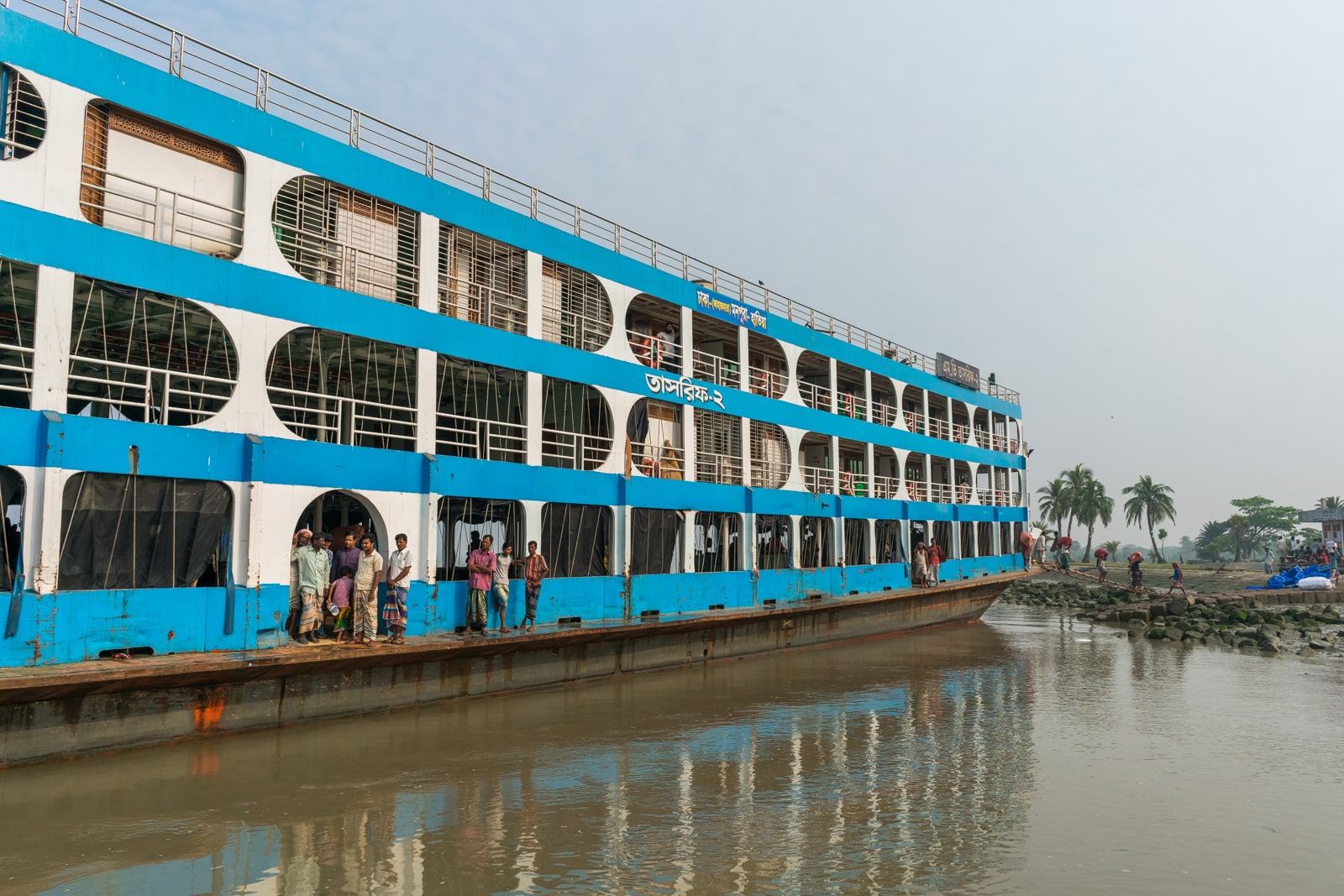
Launch docked at Tomoroddi ghat
Launch boat from Dhaka to Hatiya
Hatiya is the closest “major” town to Nijhum Dwip, accessible by bus (for most of the way) and launch from Dhaka. Though buses are slightly faster, launches are smoother, cheaper, and more pleasurable.
Launches to Hatiya leave from Dhaka’s Sadarghat at 17:30. A single cabin costs 800 Tk, and floor tickets are 200 Tk. Tickets can only be purchased on the launch itself before departure; the launch arrived at the docks around 3 in the afternoon.
Note: I was told there is another launch in the very early morning (around 5:00), but I can’t confirm the time… and wasn’t willing to risk showing up at the crack of dawn just to find out no boat was going. Feel free to try yourself!
After sailing downstream overnight and stopping at Monpura island for an hour or so, the 17:30 launch arrives at Hatiya’s Tomruddin ghat somewhere between 6:30 and 8:30. The passenger crowd will have thinned by that point, so no need to fight to get off the launch.
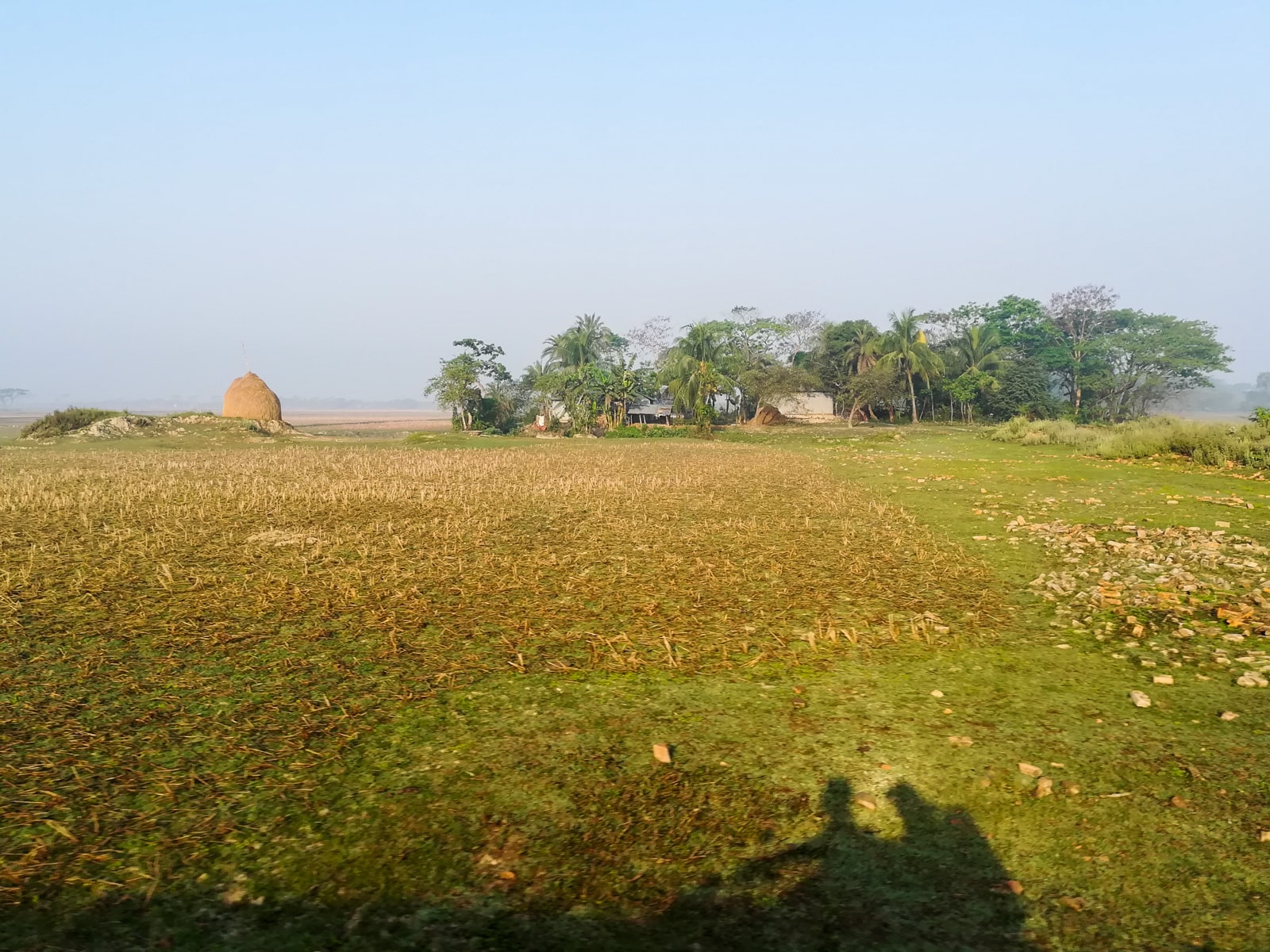
The early morning motorbike ride from Tomruddin ghat was too gorgeous. If only my big camera wasn’t packed away!
Motorbikes and boats from Hatiya to Nijhum Dwip
Finding someone to get you on your way to Nijhum Dwip from the Tomruddin launch ghat is easy enough. Motorbike taxis and auto drivers lurk around the ghat, and will swarm you when you arrive.
Since I was traveling solo, I opted to take a motorbike taxi to the ferry ghat at the southern tip of Hatiya island. I paid 350 Tk for the journey, which was a bit longer than an hour. If you’re with several people—or don’t like the idea of sitting on a motorbike traveling on crappy roads with backpacks on for an hour—opt for an auto. The drivers were quoting me 1,000 Tk for the journey, which means it should probably be around 6-800 Tk.
The motorbike driver will take you to Moktaria ghat, where you can find wooden ferries to cross the final stretch of water. The ferries leave when full, and don’t worry about waiting long—you’d be surprised how many people want to cross! You’ll need to pay a 3 Tk fee to go onto the dock, and 20 Tk for the actual crossing.
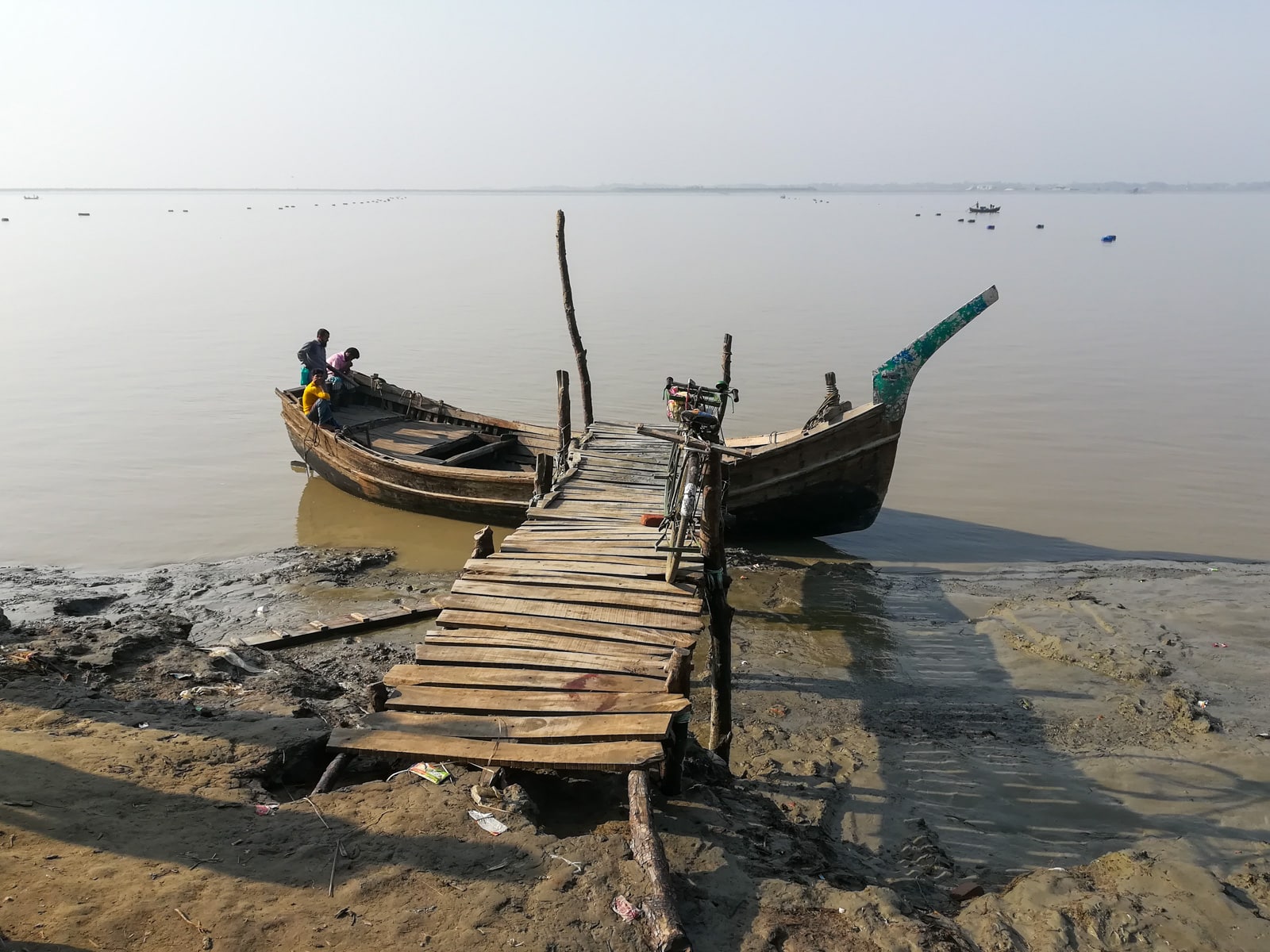
The ferry to Nijhum Dwip was empty while waiting to depart…
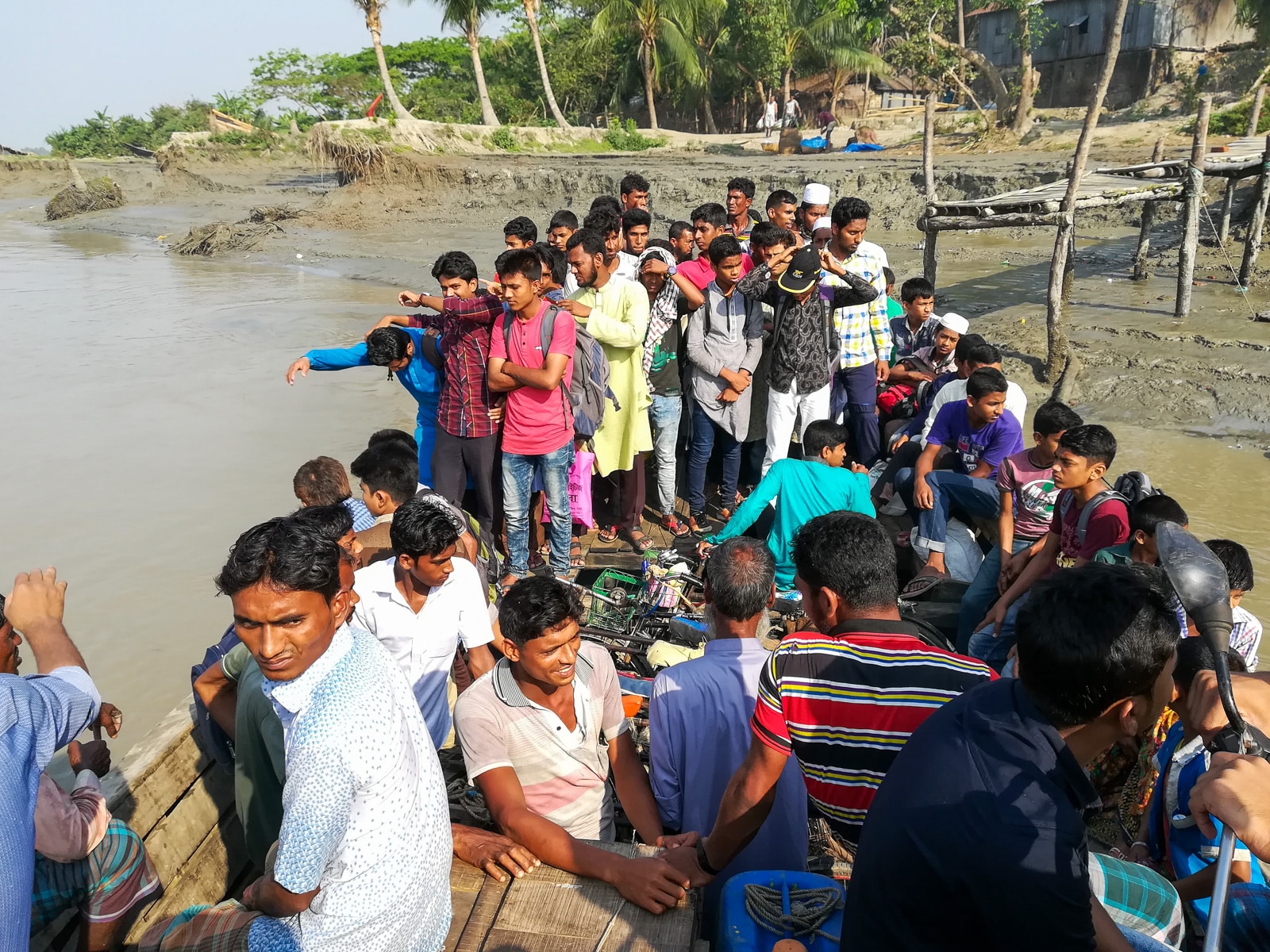
… but filled up in a hot second once it was time to depart!
After a pleasant 15 minute boat ride across the water, it’s time to hop on your last motorbike or rickshaw. There are a few hotels scattered along the island road, such as Sheraton Hotel (not actually affiliated with Sheraton) and Nijhum Dreamland, but I decided to go all the way to the island’s southern side. The motorbike ride took about 20 minutes, and cost 100 Tk. The driver dropped me in the town, where I was basically claimed on sight by a hotel owner.
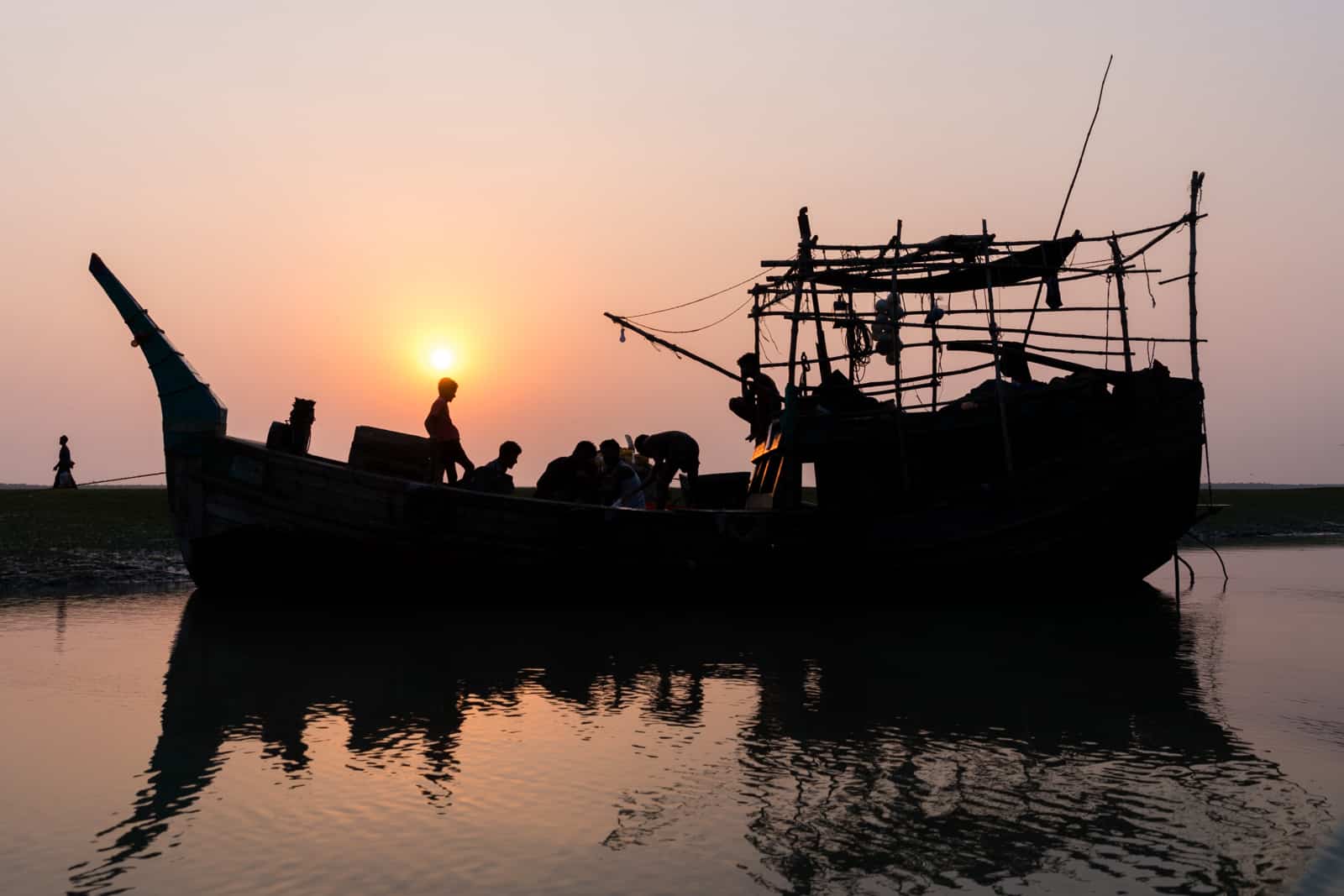
Fishing trawlers on Nijhum Dwip
Trawlers and speed boats to Nijhum Dwip
It’s also possible to get a boat from Tomoroddi ghat to Nijhum Dwip. Though I didn’t take one myself, I was told speed boats can take passengers for several hundred taka per head. The ride should take less than an hour.
If you speak a bit of Bangla, you can also try asking around to see if any fishing trawlers are heading to Nijhum Dwip. The journey will take a couple of hours, but it’ll be much more budget friendly than a speed boat.
Things to do in Nijhum Dwip
Admittedly, the island isn’t happening with hotspots and top things to do. My best advice is to just relax, enjoy the peace and quiet, and see where the road takes you.
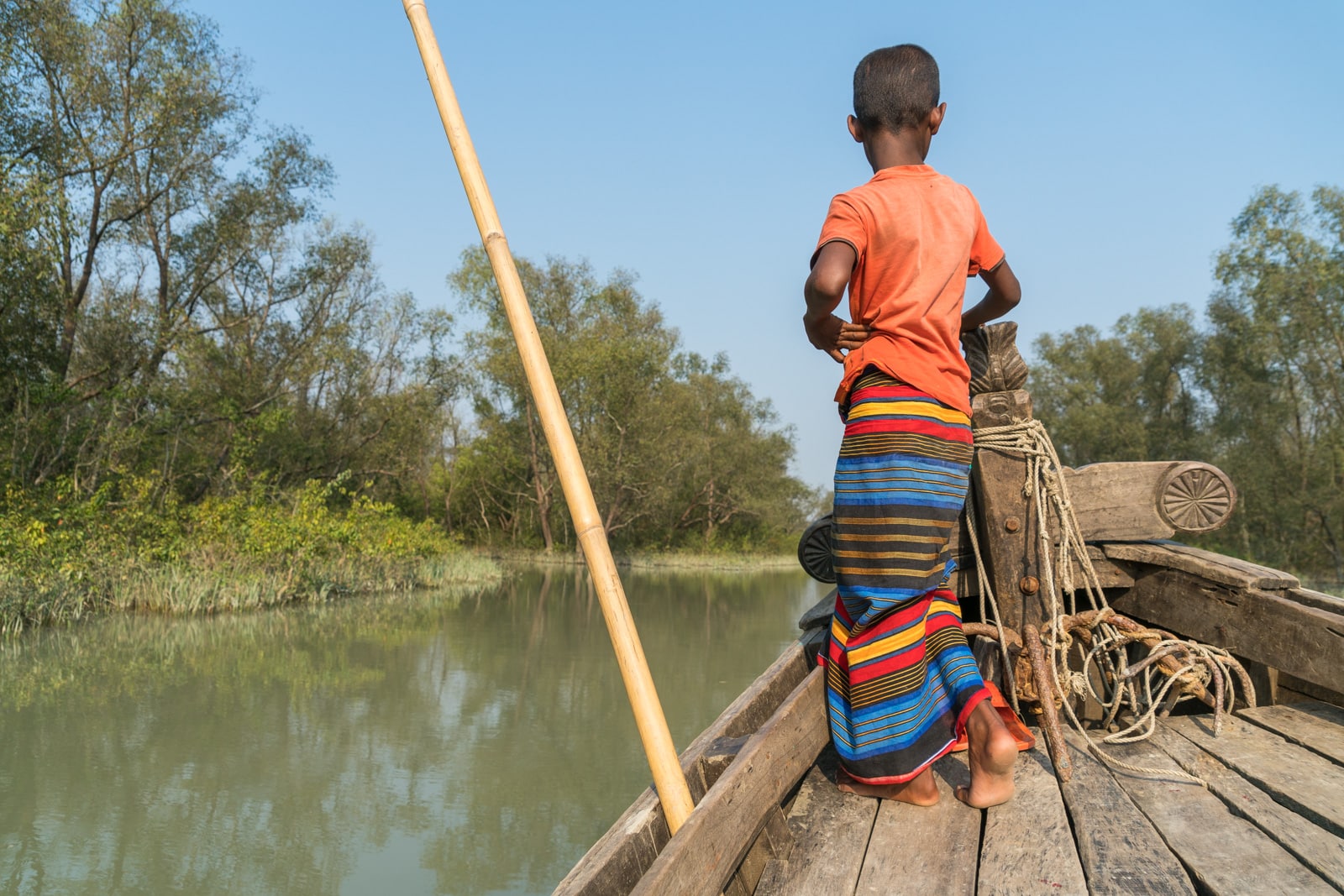
Onwards to the “deep forest”!
Nijhum Dwip National Park
The island’s main draw. A forested sanctuary created to protect and encourage the local spotted deer population, you’ll need a boat to access the deepest parts of the forest.
I was quoted 2,000 Tk for a three hour sunset boat ride—time subject to the high tide—but eventually was charged 1,000 Tk since I was alone. Though I wasn’t so impressed by the forest walk, the boat ride itself was lovely and worth the expense.
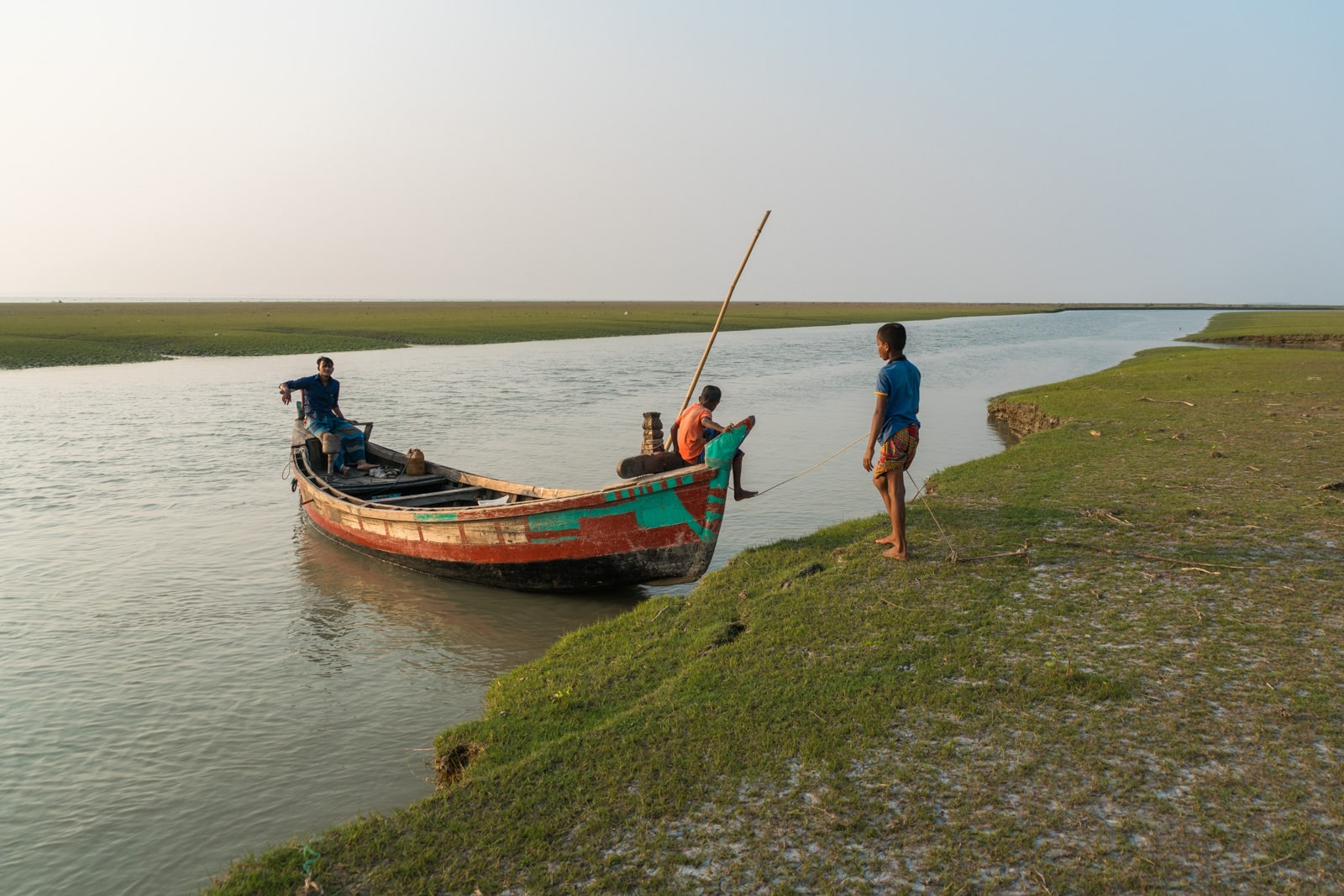
Ahoy little mateys!
If you don’t want to shell out for a boat, Soakali is a pretty area where the main road runs through the National Park, about 10 minutes’ cycling from the main town. I cycled through there in the early morning, and saw a herd of deer running across the road. Deer also occasionally wander through town in the early morning.
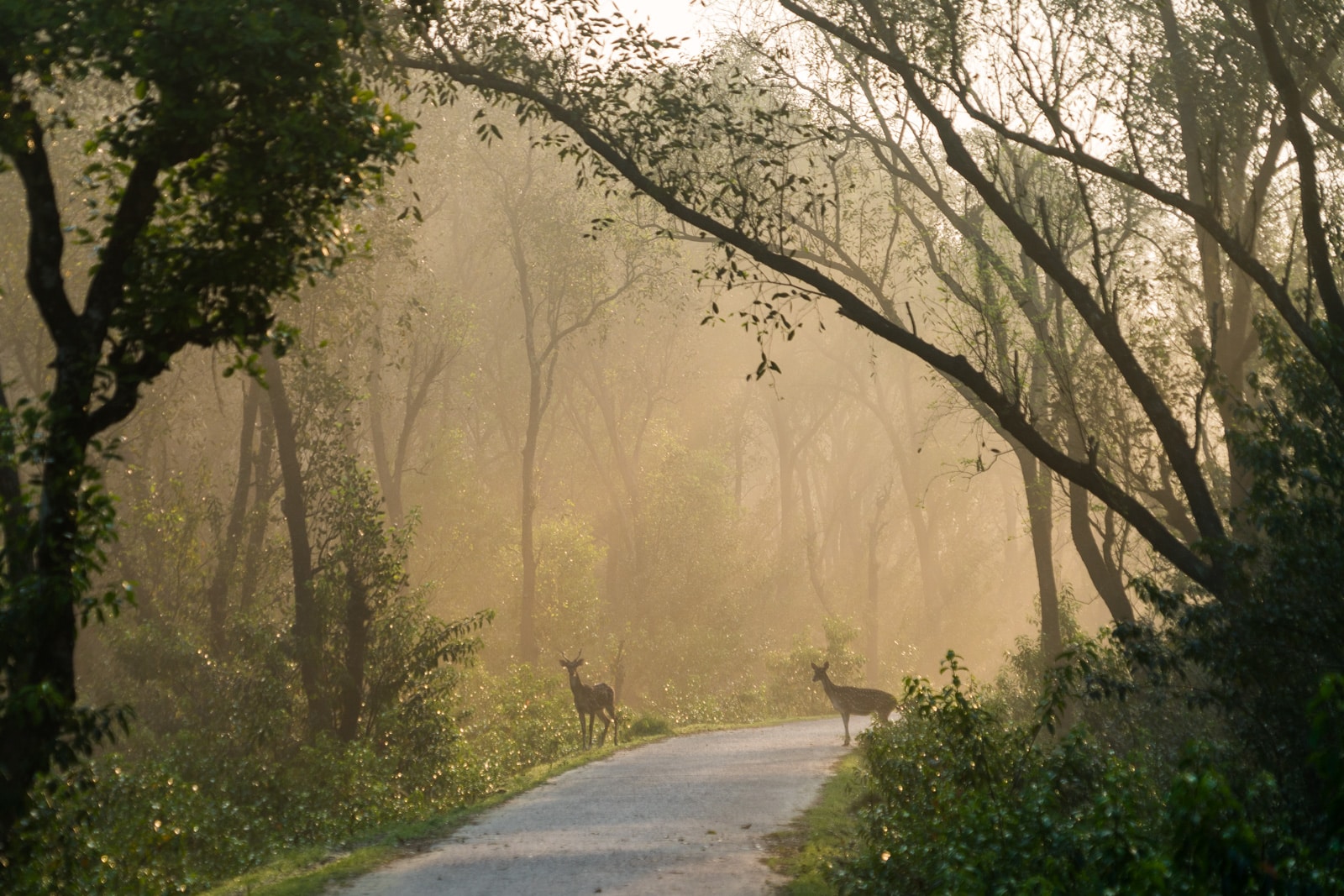
Deer crossing the road at dawn in Soakali
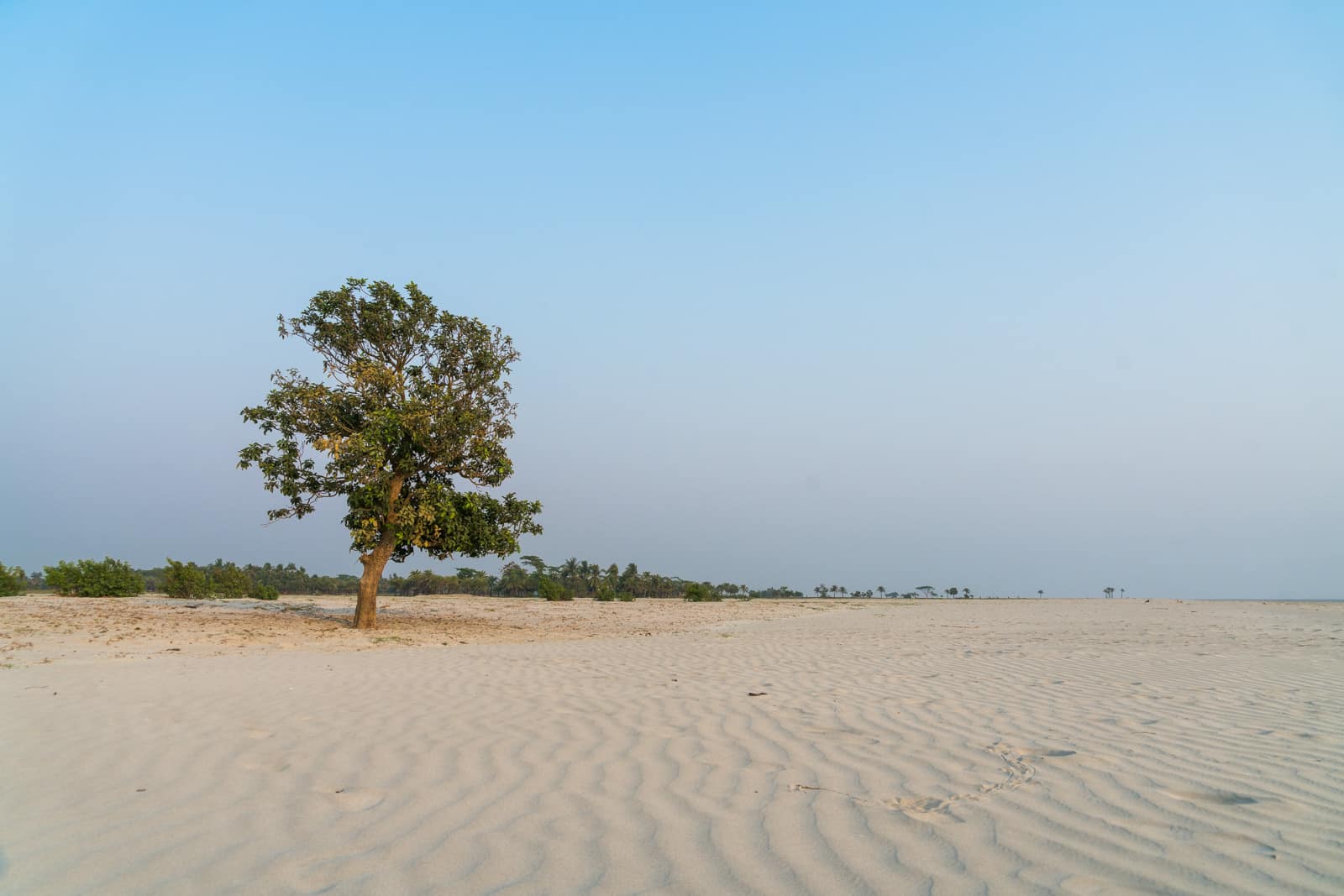
Nijhum Dwip has more than 20 km of beach. Head to the eastern part of the island—or, at least, not right by the main town—for less “touristic” beaches.
Nijhum Beach
A sandy area close to the town where most of the hotels are, it’s pleasantly white and clean compared to other South Asian beaches. Don’t expect aquamarine waters (the water was brown and uncomfortably warm when I visited in late March), but it’s pretty and a good place to watch the sun set.
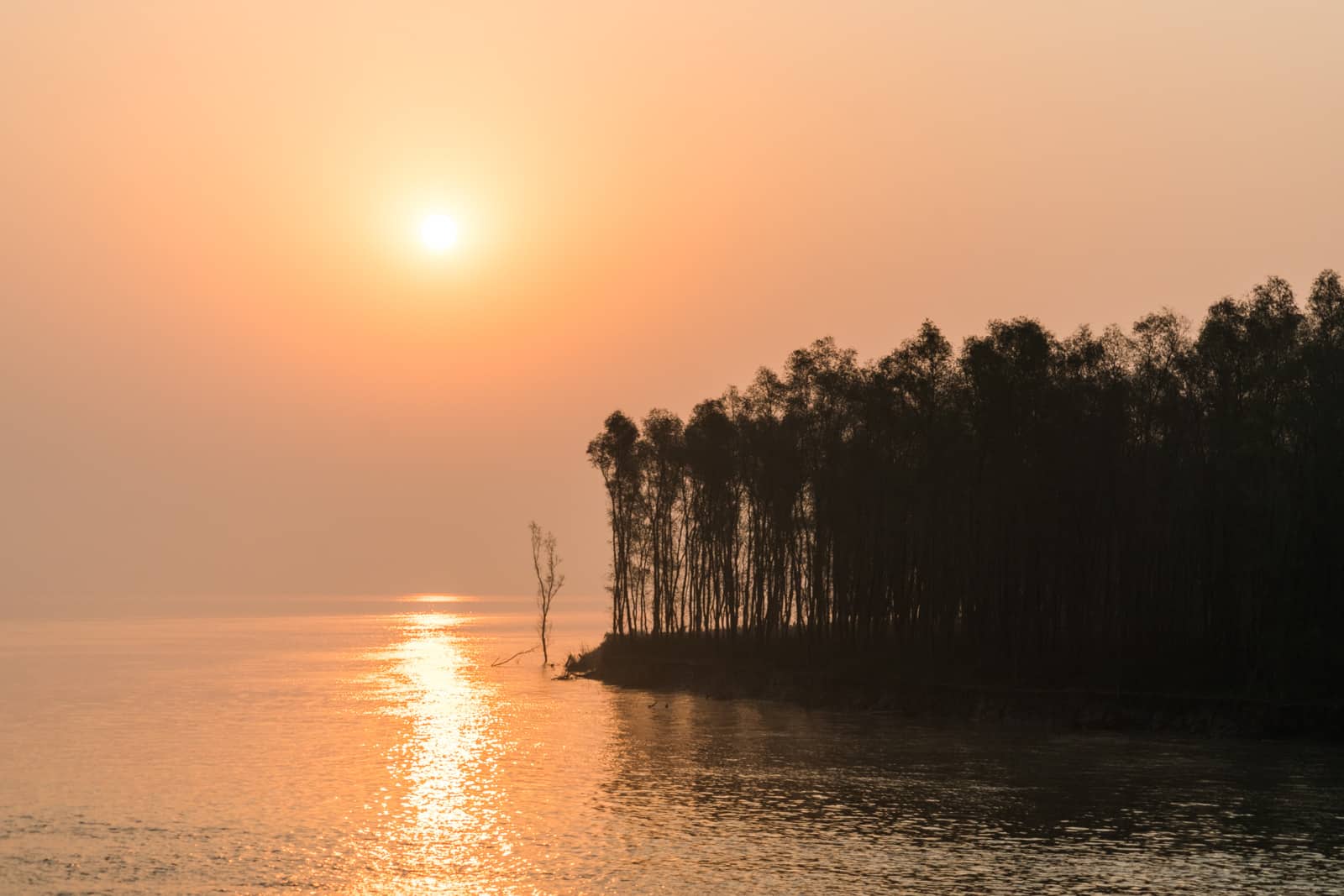
Sunrise over one of the many islands in Hatiya Upazila
Boat to islands around Nijhum Dwip
There are several small uninhabited islands around Nijhum Dwip accessible by boat. I didn’t visit any of them, but the boat man I used to visit the mangrove forest offered to take me to them on another day. Presumably the price of visiting the islands will be in line with boating to the deep forest, though ask around to make sure.
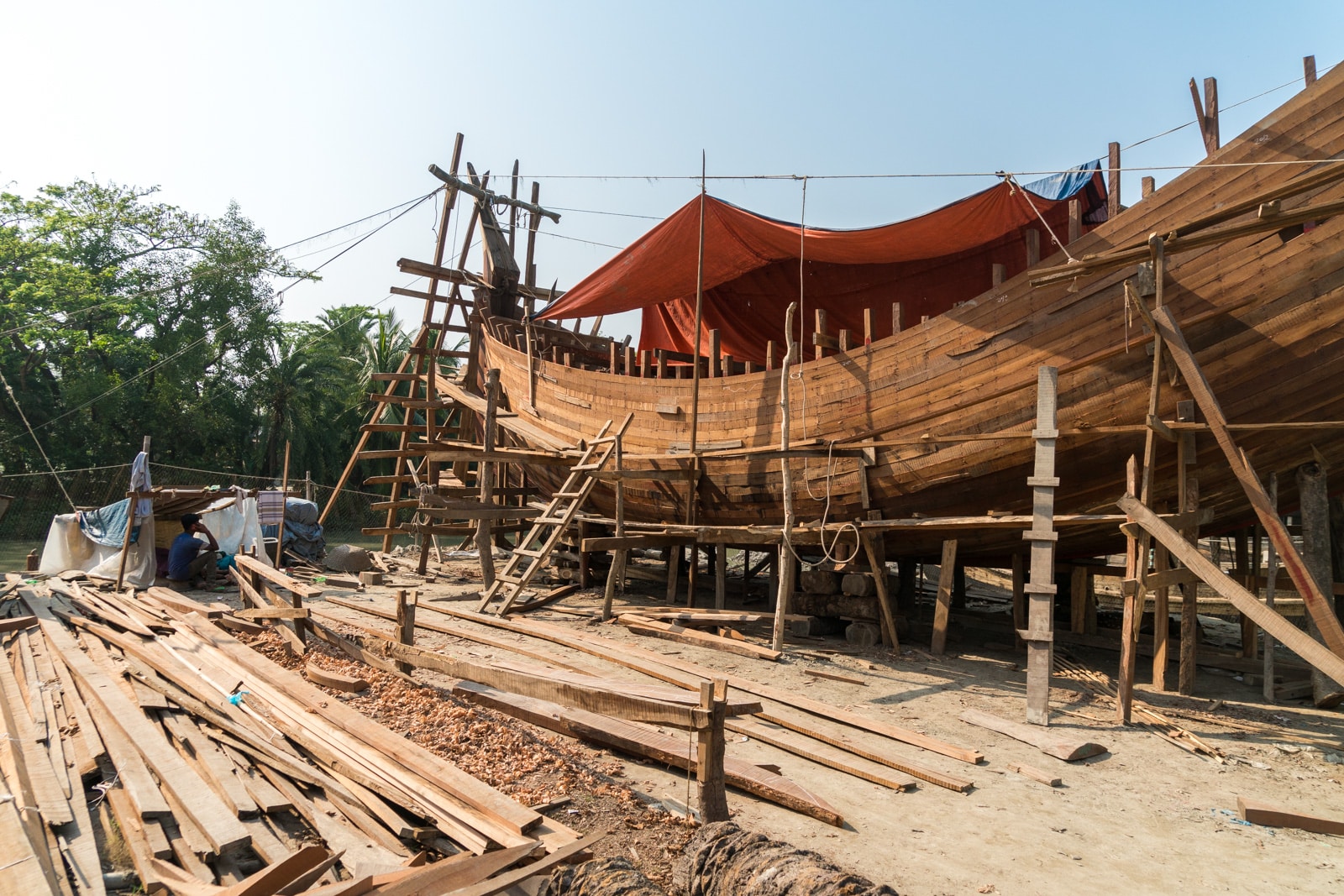
Hello, how do I acquire one of these?
Ship building
Though half constructed pirate-esque ships can be found all over the island, there’s an easily accessible yard next to Hotel Sohel and Nijhum Resort. Walk further down the path beyond the ship building area, and you’ll likely see more ship building along the waterway. When I visited in March, men were also drying and stamping down fish for chicken feed in the area.

Mmm, fishies (JK they look gross)
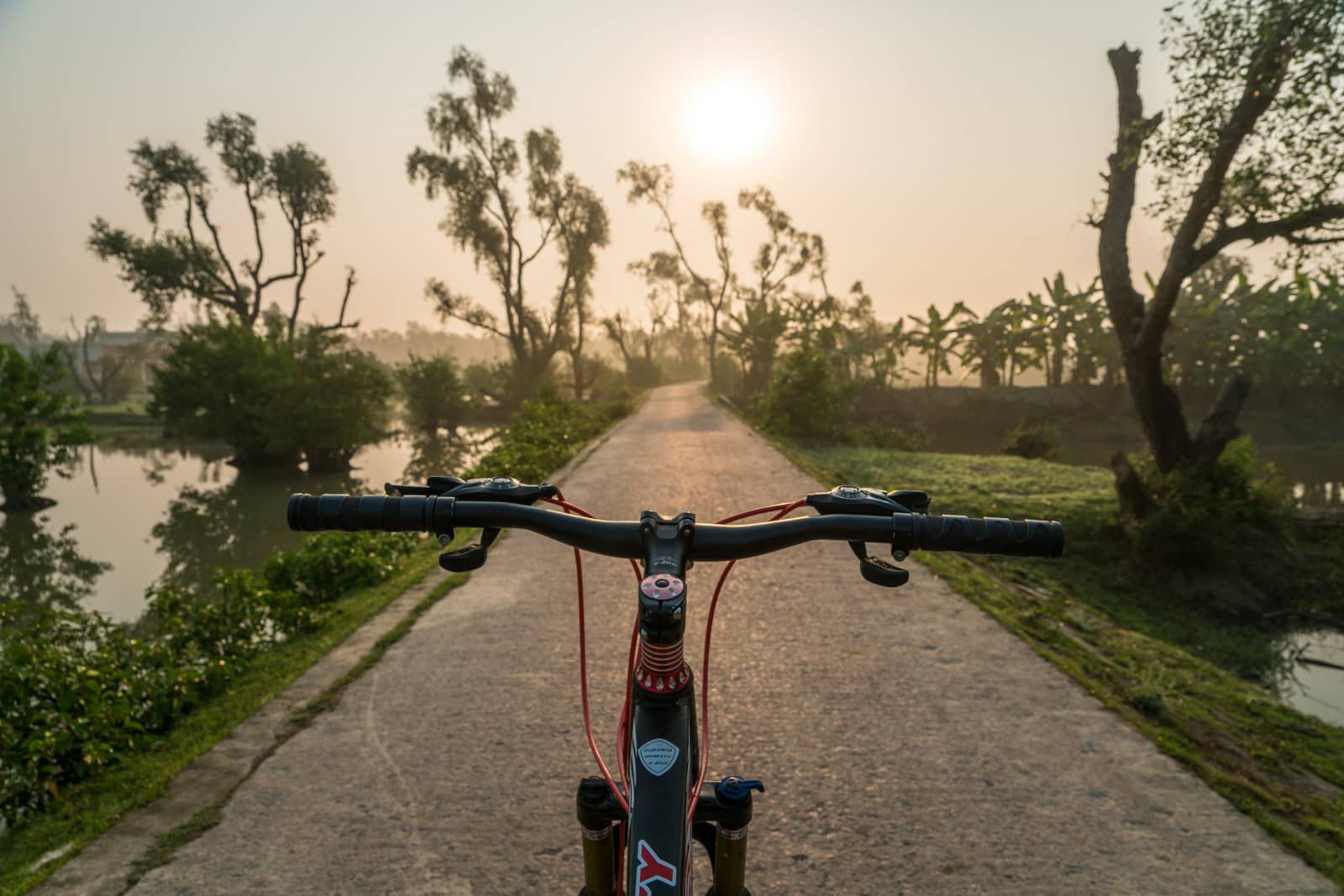
Nothing like a good sunrise cycle to put me right back to sleep start the day off right
Cycling or walking
Simple, but my favorite pastime. I sourced a bicycle for 200 Tk per day (could probably be cheaper), and traversed the island’s few roads and paths. Though I could go further on a bike, you’d be fine just walking on the myriad paths through villages and on the beaches. The people in the villages are incredibly sweet and curious—and numerous—and I had too many invitations to people’s homes to say yes to them all.
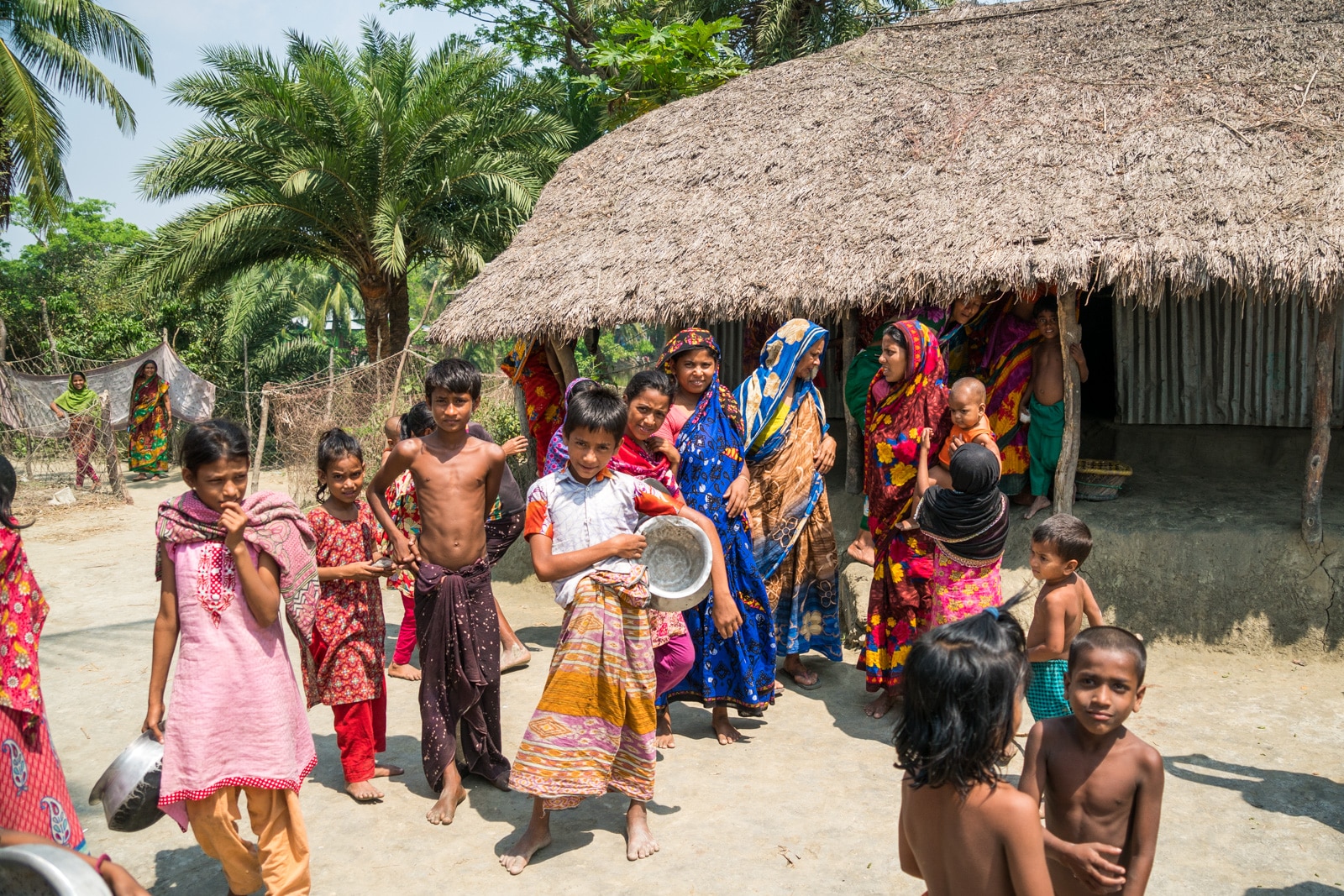
Shuttling around from home to home in a village close to the beach
Note that most of the paths are too bumpy or narrow to cycle on, and I saw some of the most spectacularly unusable roads I’ve ever encountered on Nijhum Dwip. I’d recommend hiring a bicycle just for one day, and walking around the other days.
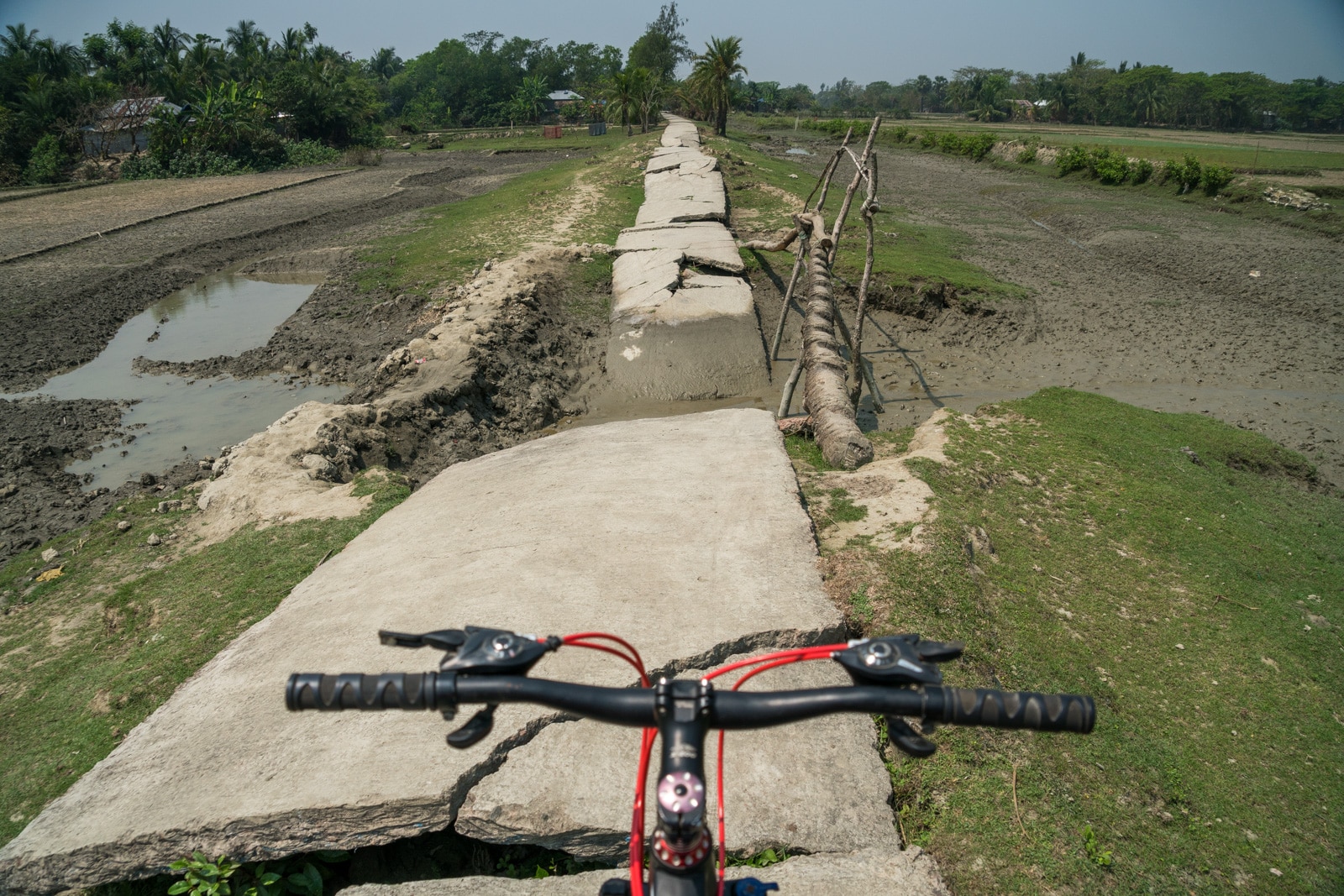
YOU SHALL NOT PASS!
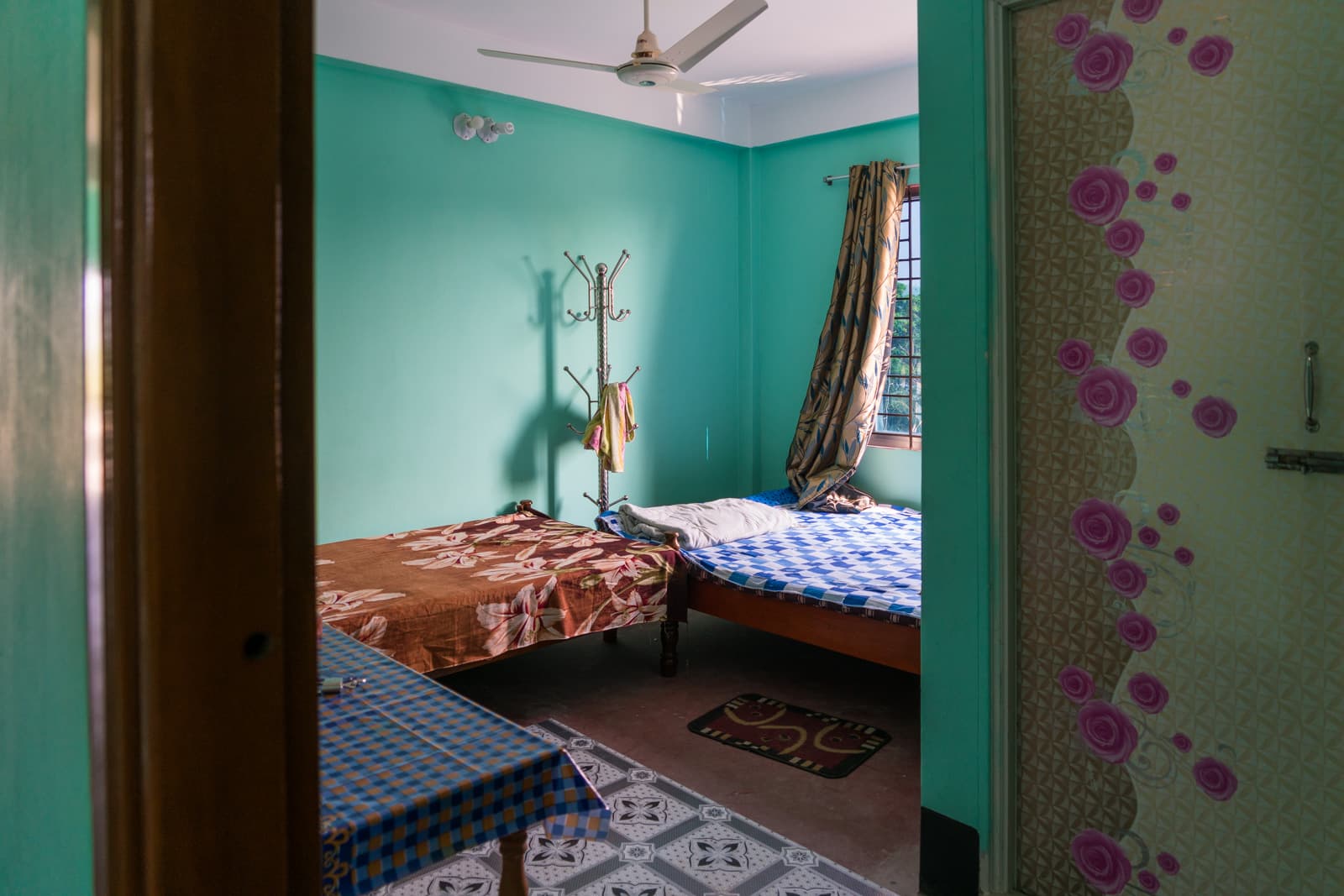
A double room at Hotel Sohel similar to my own
Where to stay in Nijhum Dwip
Accommodations on the island are relatively basic. Note that the island does not have an electricity supply, so aside from lights running on solar power, you’ll have trouble charging your devices unless someone turns on a generator.
I stayed at Hotel Sohel (018631 50881), a shockingly pink tower across from Nijhum Resort (view resort on map). Though he spoke no English, the owner of the hotel was incredibly respectful and helpful during my stay. He treated me to tea and snacks in the evenings, and found me a bicycle to roam around the island.
A double room with balcony and attached bathroom can fetch 2,000 Tk/night in winter high season, but I bargained the room price down from 1,500 to 500 Tk per night.
There are other small hotels in the area, Nijhum Resort—which not really a resort—being the most notable. A few more cheapies can be found in the market area, though I can’t guarantee they’ll take foreigners.
If you want something more upmarket, Nijhum Dreamland will be on your lefthand side after you exit the town when driving away from the ferry ghat. Rooms there range from 2,000 Tk per night to 6,000 Tk per night with 24/7 generator.
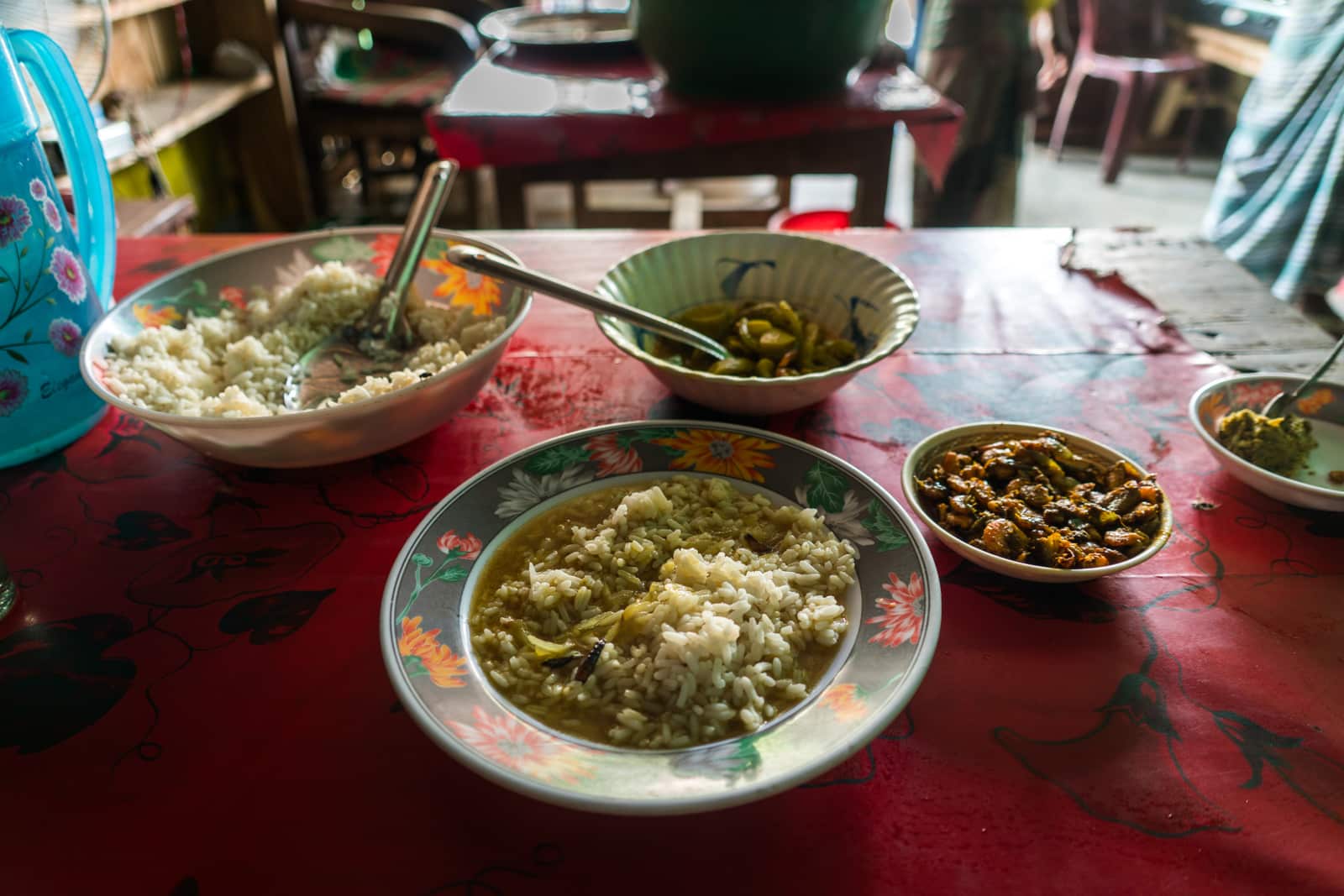
Typical lunchtime fare on Nijhum Dwip
Where to eat in Nijhum Dwip
Do not expect any mind blowing culinary experiences on the island. Food options are restricted to whatever the small hotels in the towns are serving up—think simple roti/porotha or rice combos—or whatever you ask your hotel to provide you.
Careful for those whose bellies aren’t yet accustomed to Bangladesh’s delicious hygiene standards. Hot food for dinner usually appears in the little restaurants around 20:00 or so. At other times, try not to look at the flies swarming over most of the food options, and seek out places that cover their food when not serving people. Ignorance is bliss.
Fish reigns supreme, and you’ll have an easier time finding fish or shrimp than other meats at lunchtime. Dinner is another story; after 20:30 or so, you can usually find beef, chicken, or local duck if you ask around. Vegetarians beware, a lot of the vegetable dishes have shrimp mixed in.
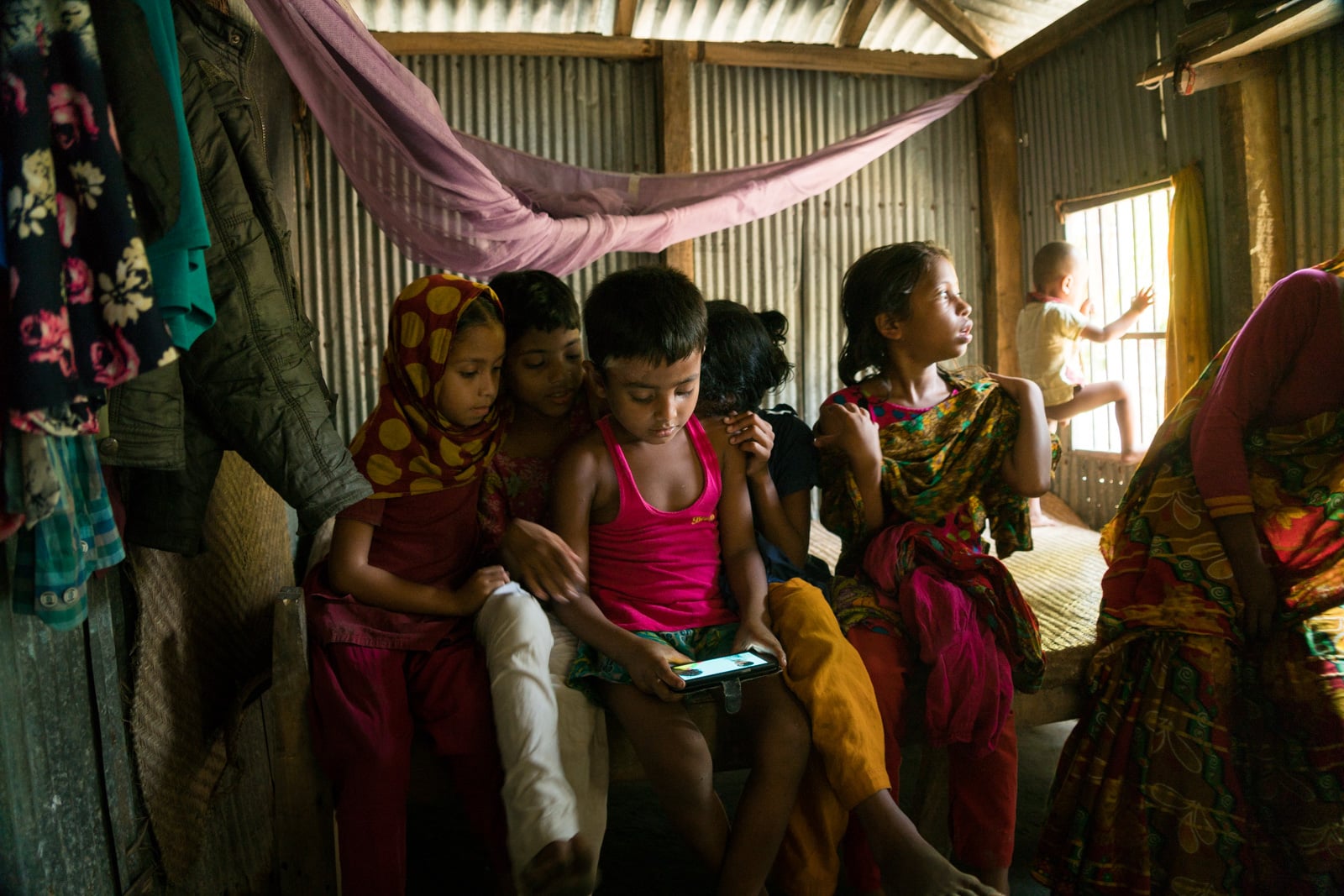
Village kids need mobile coverage, too!
Mobile networks on Nijhum Dwip
In case staying connected is a high priority for you (like it is for me!), know that the town area of Nijhum Dwip where you’ll likely stay is well connected.
My Grameenphone sim had full H or H+ in my hotel/in the town. I was also told that Robi Axiata and Airtel have coverage on the island. However, Banglalink has yet to cover the island, so prepare to disconnect if they’re your carrier.
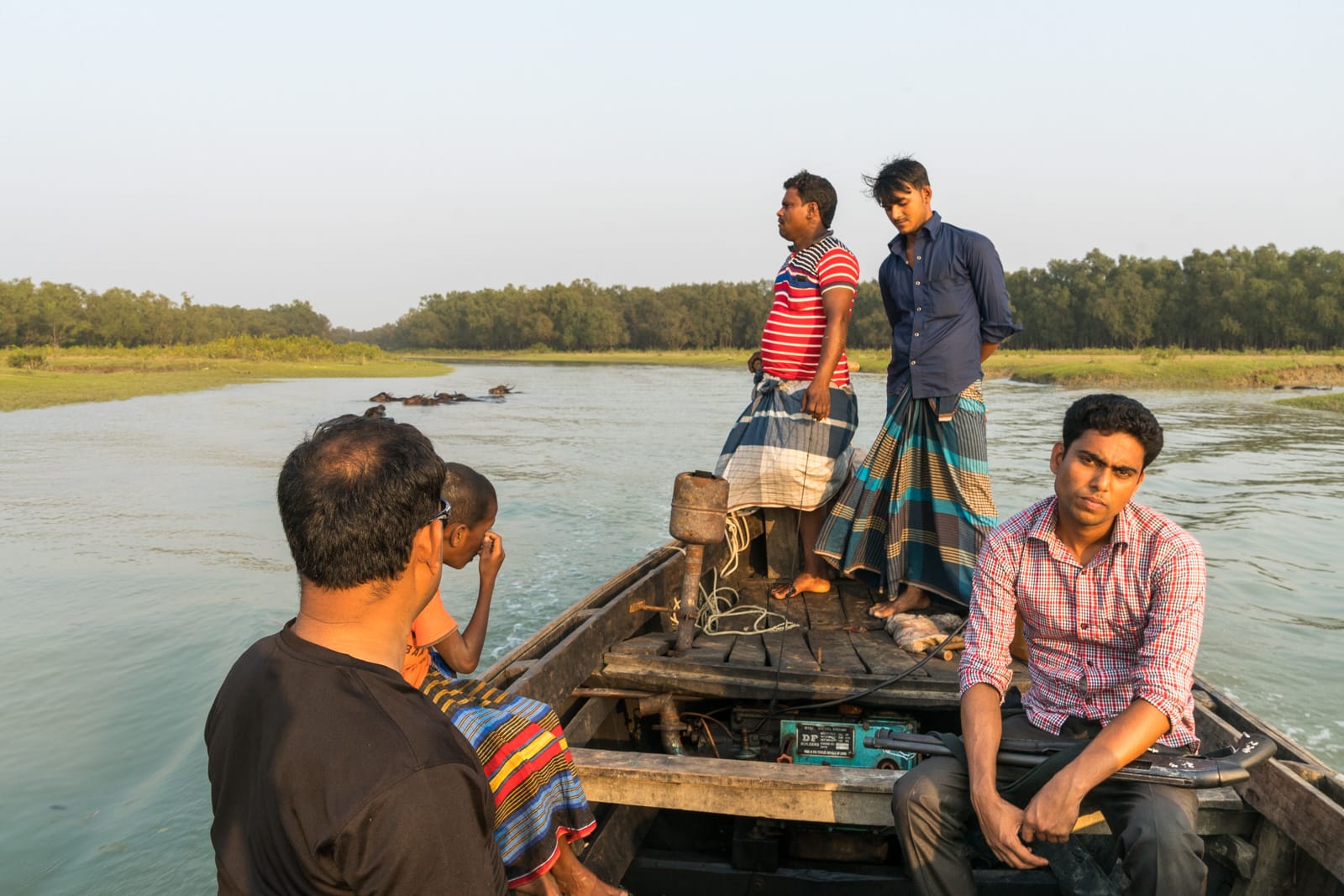
A boat full of my escorts (one with gun) on the way to Nijhum Dwip National Park
Security in Nijhum Dwip
While staying in Nijhum Dwip, I was approached by the police inspector for the island, who was presumably called in by the hotel manager.
He came in to check up on me in the evenings, and actually posted two policemen in the room across from mine for extra security in the night. I’m not sure if this was because I was traveling as a solo female (a point of great distress to him) or because I was a foreigner.
It wasn’t a big issue in the end; he was mostly interested in making sure I didn’t stray far at night. His English was decent, and I ended up going into the mangrove forest with him and some of his colleagues.

Serene sunrise scenes on Nijhum Dwip
Responsible tourism on Nijhum Dwip
A final note before you head off on your island adventure!
Nijhum Dwip is a remote island with a lot of tourism potential. Tourism can support remote communities, but it can also destroy them… and their environment. When you visit Nijhum Dwip, do your part to maintain its natural beauty and good relations between tourists and local people.
Here are some simple ways you can be a responsible tourist on Nijhum Dwip:
- Dispose of your trash properly. The most important! Do not throw your wrappers and other waste on the ground or in the ocean—carry them with you and throw them away in a bin when you return to your hotel.
- Be quiet in natural areas. Humans and animals should be able to coexist peacefully. The deer don’t want to hear groups of people screaming and shouting and playing music. Neither do I.
- Don’t give pens, sweets, or money to local children. It encourages begging. Here’s more on why you shouldn’t give pens to children.
- Talk with the local people. They are not simple animals to be ignored or used as tools; everyone on the island has their own story that we visitors can learn from.
In short: take care of the island so future generations can enjoy just like you.
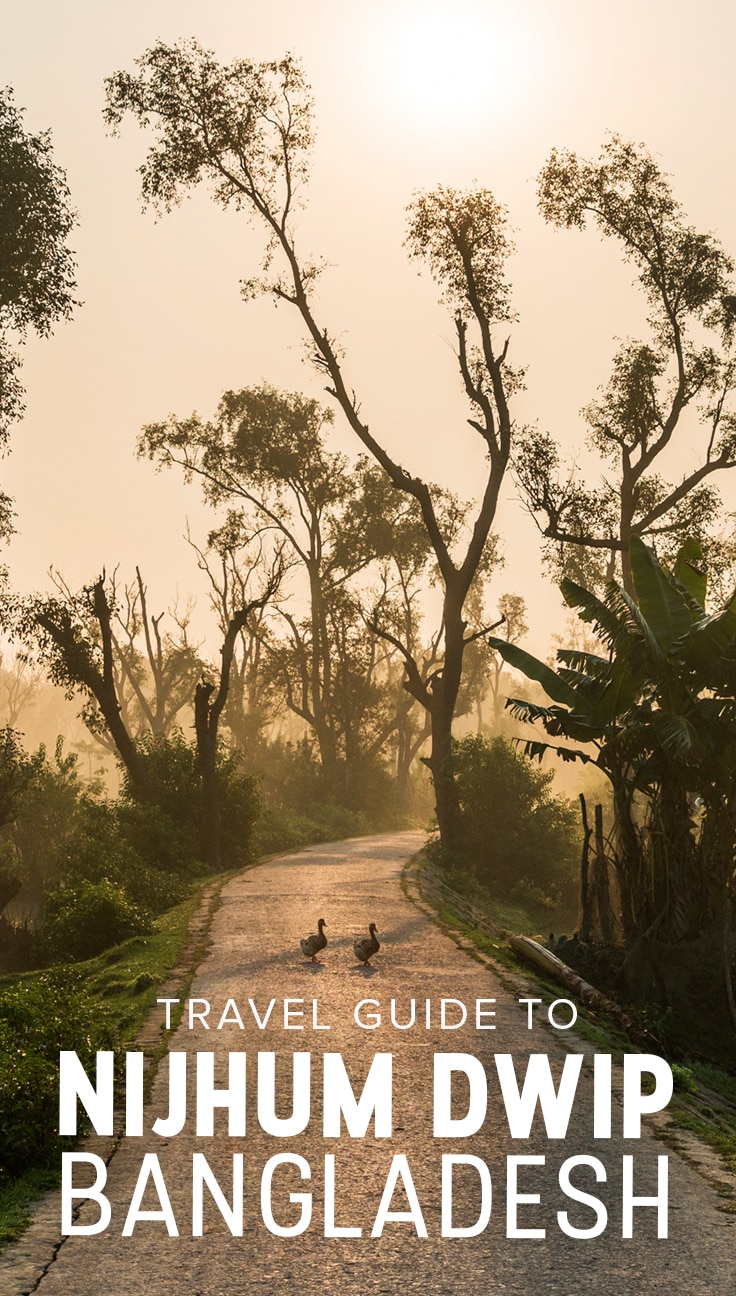
Was this useful? Pin it!
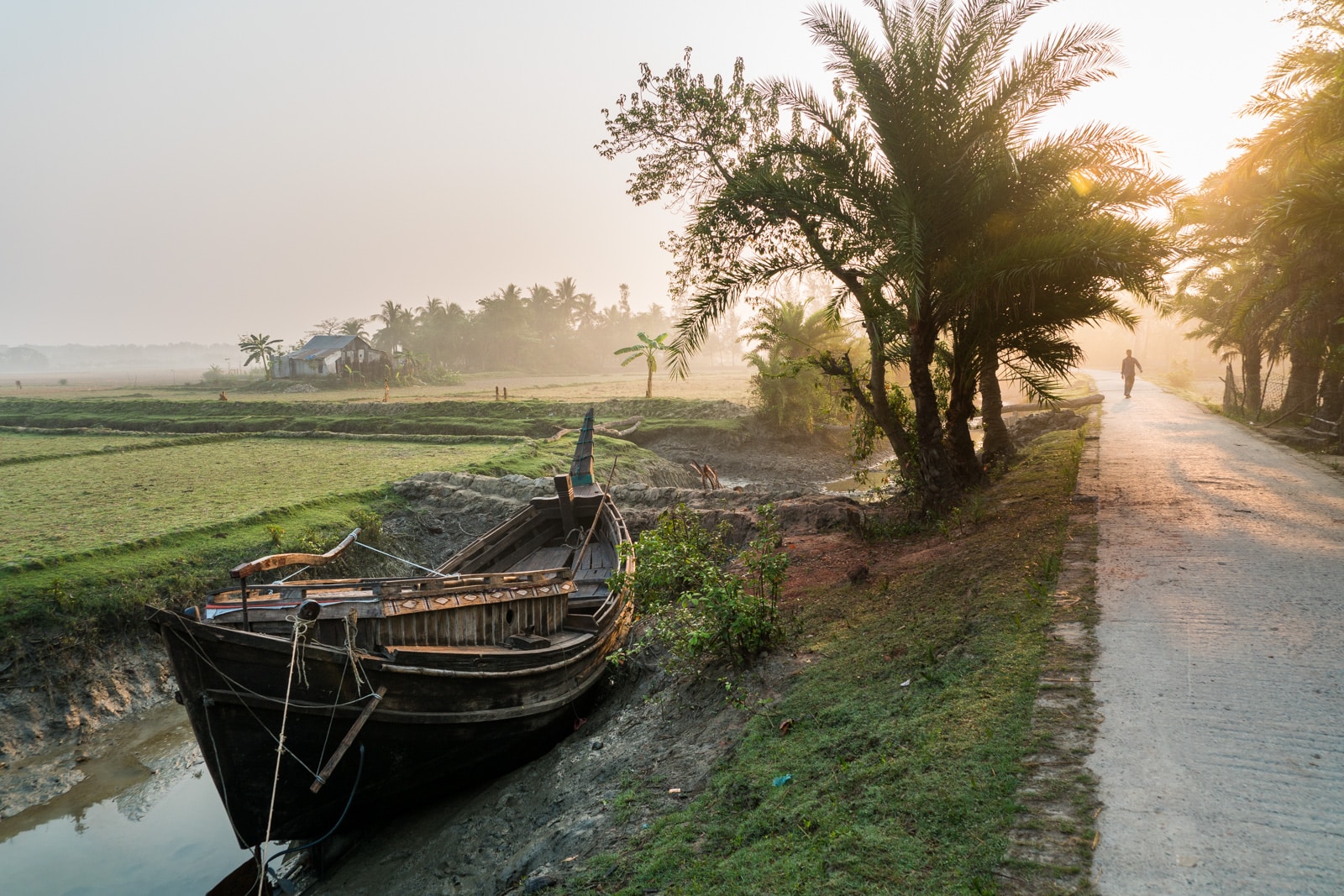


Fantastic reading experience.
Much useful information for me. I’m planning to visit Nijhum Dwip in next Feb in a group.
So lovely & helpful …… Everything describe so well! much appreciated!
Excellent expression. Useful article with full information, a tourist can easily make a plan following this article. Thanks for sharing the writings.
It is a very helpful article. I am planning for Next November . Thank you very much for given useful information
I’m glad it was useful and I hope you’ll have fun!
Excellent & Great Descriptions! Very Good Wish to The Writer & Teller!! Mind Blowing!!!
Well dunyabad! I’m glad you enjoyed it 🙂
Thank you very much dear Alex….. Your guideline will definitely help me to plan a visit. I’m leaving a comment here, as a gesture of gratefulness to you….. Cause I believe, not too many foreign visitors have praised our (Bangladeshis) remote tourist attractions and also dared to visit those alone, either male or female…… So thank you for that generosity…. Wish you lots of pleasure in travelling
Nijhum Dwip is the southern part of my hometown. I am really pleased knowing you have traveled Nijhum Dwip. Your artice is quite rich preface for travelling guide at Nijhum Dwip as well. I request you to visit my hometown once again. I hope your happy and prosperous days in future.